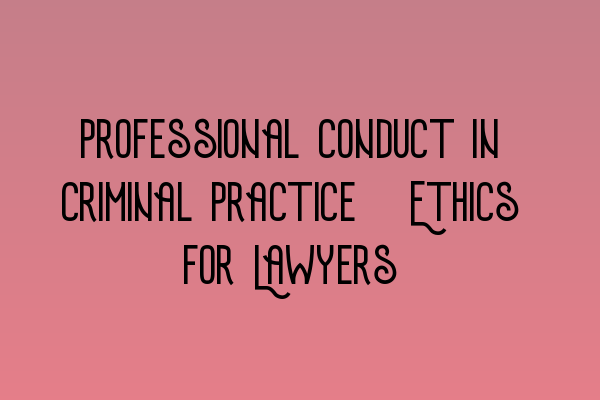Professional Conduct in Criminal Practice: Ethics for Lawyers
Welcome to the SQE Criminal Law & Practice Law UK blog. In this article, we will explore the importance of professional conduct and ethics for lawyers practicing criminal law. It is essential for legal professionals to maintain high ethical standards to ensure the integrity of the legal system and provide quality representation to clients.
The Role of Ethics in Criminal Practice
As lawyers, our primary duty is to serve the best interests of our clients while upholding the principles of justice and fairness. Ethical conduct forms the foundation of our profession and is crucial in maintaining public trust and confidence in the legal profession.
When practicing criminal law, lawyers often deal with high-stake cases where individuals’ rights and freedom are at risk. The ethical responsibilities of a criminal lawyer include maintaining client confidentiality, avoiding conflicts of interest, and diligently representing their clients’ best interests within the bounds of the law.
One of the fundamental aspects of professional conduct in criminal practice is client confidentiality. Lawyers must ensure that all client information remains confidential and privileged. This duty of confidentiality not only protects the client but also promotes open and honest communication between the lawyer and client, essential for effective representation.
Avoiding Conflicts of Interest
Avoiding conflicts of interest is another vital ethical duty for criminal lawyers. It is crucial to ensure that representation is not compromised by personal or financial interests that may undermine the lawyer’s ability to act in the client’s best interests.
In the context of criminal practice, conflicts of interest can arise when a lawyer’s personal relationship or financial interest may interfere with their duty to provide unbiased representation. It is essential for lawyers to identify and address potential conflicts of interest to protect the client’s rights and maintain their professional integrity.
To ensure ethical conduct, criminal lawyers should also refrain from engaging in any conduct that may undermine the administration of justice. Engaging in dishonest practices, subverting the legal process, or misleading the courts can have severe consequences not only for the lawyer but also for the client and the justice system as a whole.
Maintaining Professionalism and Integrity
Professionalism and integrity are hallmark qualities of a reputable criminal lawyer. Upholding the highest standards of professionalism requires lawyers to demonstrate competence, diligence, and respect for all parties involved in the criminal justice system.
Lawyers must also maintain their professional knowledge and skills by continually engaging in professional development activities and staying updated with developments in criminal law. This commitment to ongoing education ensures that lawyers are equipped to provide the best possible representation to their clients.
At SQE Criminal Law & Practice Law UK, we understand the significance of ethics and professional conduct in criminal practice. We offer comprehensive SQE preparation courses that not only cover substantive legal knowledge but also emphasize the importance of ethical awareness and professional responsibilities.
For practising SQE 1 Criminal Law & Practice, we recommend taking SQE 1 Practice Exam Questions and SQE 1 Practice Mocks FLK1 FLK2 to enhance your understanding and competency. These resources will help you prepare effectively for the SQE exams and reinforce your knowledge in criminal law.
If you are preparing for SQE 2 Criminal Law & Practice, our SQE 2 Preparation Courses are designed to provide extensive coverage of essential topics and practical skills required for successful criminal practice.
Stay updated with the latest SRA SQE Exam Dates to ensure you are well-prepared and ready to excel in your SQE exams. Excelling in your exams not only demonstrates your legal knowledge but also reflects your commitment to the ethical standards expected of a competent criminal lawyer.
In conclusion, maintaining professional conduct and ethical awareness is vital for lawyers practising criminal law. Upholding the principles of justice, client confidentiality, and avoiding conflicts of interest are key elements of ethical practice. By prioritizing professionalism and integrity, lawyers can ensure the trust and confidence of their clients and the wider community.
For more information about our SQE preparation courses and resources, visit SQE Criminal Law & Practice Law UK.
